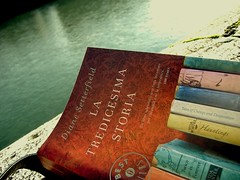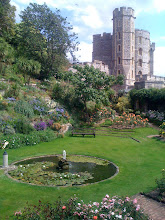Hey kids -
I hope you are surviving midterm exams! Just a reminder - you only have ONE more weekend to finish The Thirteenth Tale!
I promised I wouldn't make you do any work related to the novel while you were reading it and I hold true to that promise... however, as of Monday, February 9th, that promise expires.
In preparation for class the weeks of February 9th and 16th, come to class each day prepared with a written answer to the following assigned questions:
Tuesday, February 10th:
Consider this quote: "All children mythologize their birth. It is a universal trait. You want to know someone? Heart, mind and soul? Ask him to tell you about when he was born. What you get won't be the truth; it will be a story. And nothing is more telling than a story." -- Vida Winter.
How does this quote act as a thesis for the entire novel?
Wednesday, February 11th
Margaret tells a tale in the book of becoming so engrossed in reading a book that she falls off the wall where she is sitting. She suggests that this proves that "reading can be dangerous."
The Thirteenth Tale shows that reading is powerful, and that the dangers of reading are far more pervasive and can be far darker than Margaret's amusing childhood tale would allow. These dangers are not confined to the naive reader, nor can they be limited to childhood. Reading is a dangerous pastime; words have an inescapable physicality and can work for profound good or profound evil. Do you agree with Margaret about the danger of reading? Why, or why not?
How does this connect to our study of Blake's Three Stages of Being?
Thursday, February 12th
When Margaret challenges Miss Winter on the many versions of her life story she has already told, the author replies "It's my profession. I'm a storyteller." For Miss Winter, Margaret's pursuit of biography, her insistence on working with facts, is "horribly dull...Don't you think one can tell the truth much better with a story?" (p. 46). Who do you agree with more, and why? What makes someone's life story fiction? A biography? A memoir?
Friday, February 13th:
Like the book whose secrets are hinted at by its cover, houses reveal much about their owners. This is especially true in The Thirteenth Tale, where houses are virtual reflections of their inhabitants. Margaret's room above her father's bookshop, Angelfield, and Miss Winter's Yorkshire home all reveal much about the people who live in them, as does Aurelius's cozy cottage. What did you think about the meaning of houses and other structures in The Thirteenth Tale? What do the characters' surroundings say about them and their role in the novel?
Tuesday, February 17th:
Consider our study of Romanticism and apply the definitions we drafted in class to the following: What does Dr. Clifton mean when he tells Margaret that she is "suffering from an ailment that afflicts ladies of romantic imagination"?
Also, choose one character from the novel and gather 10 quotes from the book that reveal, directly or indirectly, that person's true "character".
Wednesday, February 18th:
The Thirteenth Tale is, at its core, a novel about secrets and the ways that the characters are shaped by secrets, their own and the secrets of those around them. Vida Winter is "as famous for her secrets as for her stories" (p. 11), and Margaret is forever scarred by her discovery, at the age of ten, that her mother has kept a secret. What role do secrets play in the story, and which ones did you find most surprising?
Monday, February 2, 2009
Subscribe to:
Comments (Atom)

